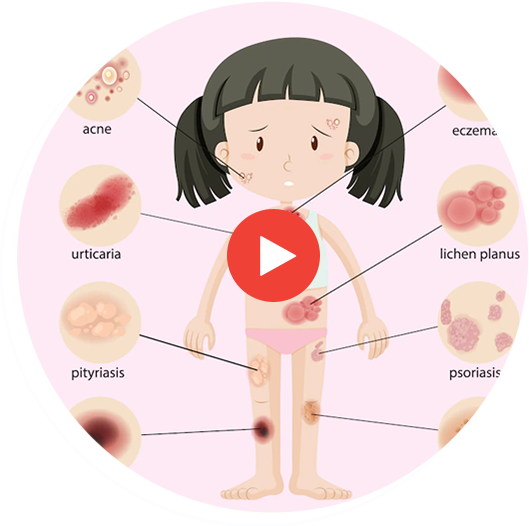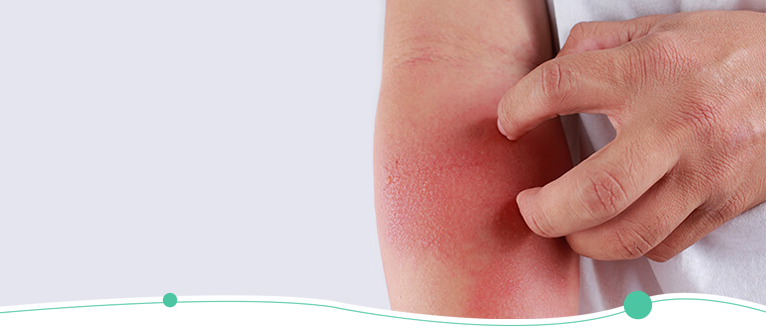
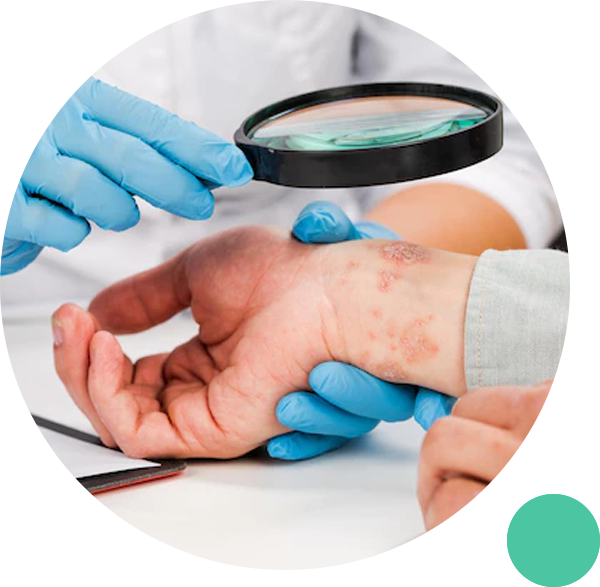
While eczema can be treated successfully by a virtual doctor for eczema, it can come back if you stop using steroid creams. It is important to get eczema treatment online as this can help prevent it from coming back again.
TELMDCARE
What is
Eczema?
Eczema is an inflammatory skin disease often caused by a condition called atopic dermatitis (AD),
which affects more than 40 million people in the United States alone. This includes more than 10
percent of children under 5.
It is common in people with a family history of it but can also occur for no known reasons
causing the skin to become very itchy and irritated. Eczema usually causes moderate to severe
itching and red patch rashes but could also cause cracks, dryness, or peeling with clear patches
of skin-like blisters. Other symptoms include spots or scabs on the scalp extensions and
elsewhere in the body as well as swelling. The most affected areas are usually the folds of skin
covering the outer part of the body, including inside the arms, legs, and hands.
So, if you have eczema, you may wonder what causes it or if any effective treatments are
available. Here’s all you need to know about the condition:
TELMDCARE
Is covered by many popular
insurance plans

TELMDCARE
Symptoms of Eczema
Some people have mild symptoms of eczema, while others have more severe symptoms. The severity of
your eczema will be determined by the factors that trigger it and the extent to which you're
affected.
The most common symptom of eczema is skin irritation, but there are many other signs and
symptoms as well. These include:
If you notice any of the symptoms listed above, it’s important to get eczema treatment online from a reliable online doctor for eczema.
Causes of Eczema
There are many causes of eczema. Some people have it for no apparent reason and others develop it in response to an outside trigger, such as a particular food or environmental factor, including allergies, infections, and irritants.
Causes of Eczema
The most common risk associated with urethritis is a bladder infection (cystitis), which can be caused by bacteria or yeast that enter the urinary tract through the urethra.
All You Need To Know
About Allergic Reactions
Allergic reactions to certain topical products or environmental substances such as pollen, dust mites, pet dander, latex, detergents, medications,
TELMDCARE
Causes of Eczema
The following are the most common causes:
Infectious Diseases
Certain infectious diseases can cause eczema, including chickenpox and measles. In addition, some types of eczema may be caused by other viruses, such as human herpes virus6 (HHV6).
Genetic Disorders
Some people inherit a genetic predisposition to eczema from their family members. For example, if one parent has eczema, there is an increased risk that a child will also be affected by the condition.
Immune System Problems
Some people have an increased susceptibility to developing eczematous skin conditions because of immune system problems that occur during pregnancy or after childbirth. This includes preeclampsia (high blood pressure) and postpartum depression (low mood).
Bacterial Infections
Certain bacterial infections can cause eczema on the scalp or face, known as tinea capitis (ringworm infection) or tinea corporis (scabies). These infections are more common in children and are easily treated with prescription medications.
TELMDCARE
As Seen On

TELMDCARE
Will Eczema Go Away On Its Own?
No. Eczema often comes back after a flare-up, but it does not go away permanently on its own.
Treating mild to moderate cases of eczema with steroid creams may help reduce symptoms over
time, but this will not reverse the disorder completely. If you have severe cases of eczema, get
in touch with our virtual doctor for eczema immediately.
Remember that food allergies are one of the most common causes of eczema flare-ups, and they
often start in infancy or childhood. Symptoms include itchy skin, redness, swelling, hives, and
fever. In addition to having food allergies, some people react to certain foods even if they
don’t have any other symptoms related to an intolerance or allergy.
Low levels of certain vitamins and minerals are linked to an increased risk for developing
eczema — especially vitamin E, zinc, selenium, and magnesium — so if your child is experiencing
symptoms related to low levels of these important nutrients (such as fatigue, hair loss or dry
skin), talk to their online doctor about getting tested for eczema.
Certain types of drugs like aspirin and ibuprofen can cause eczema flare-ups due to their
anti-inflammatory properties. Some over-the-counter pain medications like acetaminophen
(Tylenol) can also cause itching when taken for extended periods because they interact with your
body’s natural pain signals.
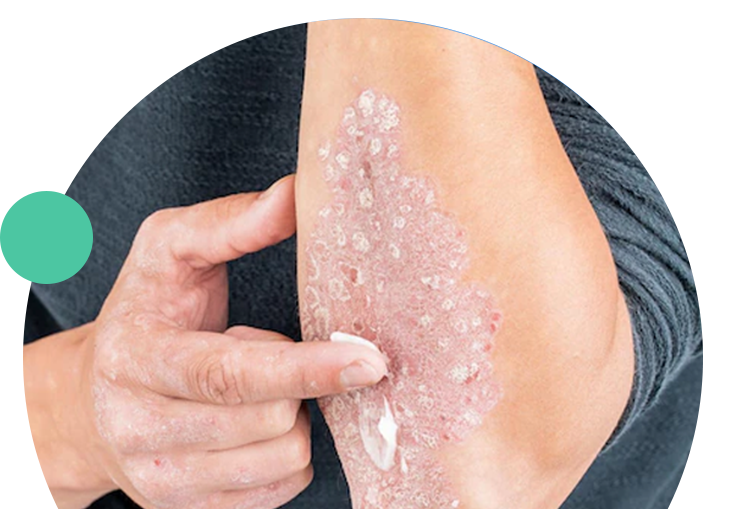
TELMDCARE
Types Of Eczema
There are several types of eczema, each with its characteristics and skin condition. Let’s learn about them:
Atopic Dermatitis
Atopic dermatitis is a chronic skin condition that occurs in genetically predisposed individuals. It is characterized by dry, itchy skin with elevated levels of IgE antibodies. The most common areas affected include the scalp, face, arms, thighs, and backs of hands. Atopic dermatitis can cause severe itching that can lead to scratching and scarring. The inflammation causes skin redness and scaling as well as pain upon touch.
Contact Dermatitis
Contact dermatitis is a type of allergy caused by chemicals or irritants in topical medications, cosmetics, soaps, or detergents. When the skin is exposed to these substances, an allergic reaction occurs, leading to inflammation and itching that can last for days or weeks after use.
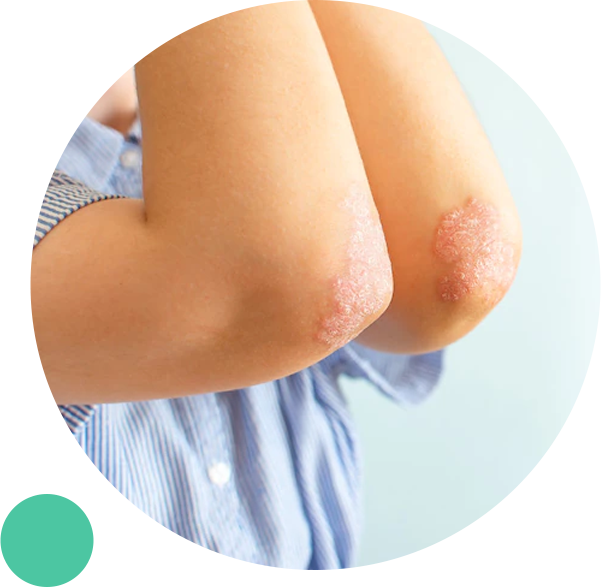
Neurodermatitis
Neurodermatitis, commonly known as discoid eczema, is a type of eczema that only affects small areas of the skin. They consequently become scaly and irritating.
Dyshidrotic Eczema
Dyshidrotic eczema dries up the skin and can result in blisters, rashes, and burning sensations.
Nummular Eczema
Nummular eczema, also known as nummular dermatitis, is a type of eczema that causes small, spherical lesions on the body, primarily on the arms and legs.
Seborrheic Dermatitis
Seborrheic dermatitis is an itchy, eczematous condition that affects your scalp.
Stasis Dermatitis
Stasis dermatitis is a skin discoloration that resembles varicose veins on the legs.
Medication services available 24/7 for adults and kids (3+)
Top quality, board-certified doctors
No insurance needed
Same-day prescriptions available*
*Prescriptions provided at doctor’s discretion.

TELMEDCARE
What we treat
We treat a variety of acute and chronic conditions and provide expert medical advice and guidance for our patients.
Read More
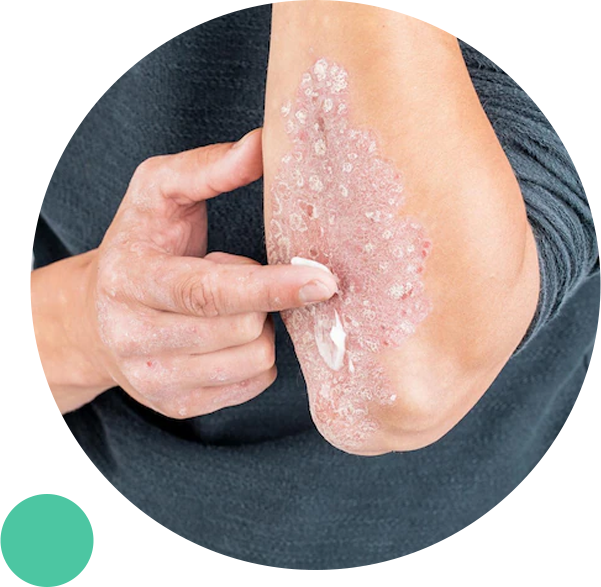
TELMDCARE
Treatment Options
For Eczema
Many different treatment options may be used to treat eczema. Some of the most common include:
Oral medications
Oral medications, such as corticosteroids, retinoids, and calcineurin inhibitors, are effective in treating eczema. Corticosteroids may be used as a first-line treatment for mild to moderate eczema. They're usually taken by mouth once or twice daily and can help reduce redness and itchiness on the skin. Calcineurin inhibitors can also be prescribed by your virtual doctor for eczema, but they have been linked to an increased risk of infection and decreased effectiveness in some people.
Antihistamines (diphenhydramine)
Antihistamines can help relieve symptoms of itching by blocking histamine receptors in your body's immune system. In addition, they may be used to treat allergic reactions such as hay fever (seasonal allergies) and contact dermatitis (hives).
Antibiotics
Antibiotics are the first-line treatment for severe eczema and can help with itching and
flare-ups. They’re often prescribed by an online doctor for eczema in conjunction with other
treatments, such as steroid creams or moisturizers.
Antibiotics work by killing off any bacteria that might be causing your skin to flare up. If you
have a severe case of eczema, your immune system is likely compromised and unable to fight off
the infection without help from antibiotics.
Skin Ointments
Skin ointments are a good choice for eczema, especially if you have a lot of redness and itching. These can be used on the skin directly or with a bandage. They come in various forms, from creams to moisturizing lotions to salves. They are best used when your skin is irritated, and you're still able to sleep comfortably at night. If you find that your eczema gets worse when you use these products, talk with your online doctor for eczema about switching to another type of ointment.

Get Affordable and Reliable Treatment For
Eczema Online At TelMDCare
TelMDCare is one of the most reliable online platforms for health care that provides affordable
and reliable treatment for skin diseases, including dandruff, acne, and eczema. Our experts also
offer treatment for other common skin conditions like psoriasis, rosacea, and more.
Our team of qualified internal medicine and family doctors provides quality treatment for eczema
online, starting at just $43. Signup to schedule an appointment with our general physicians. We
also provide online chat alternatives and free follow-up services without making you wait.
Get in touch with us for online treatment for eczema.
TELMDCARE
Sign Up
Our best online doctors on call ensure that the services we provide are adequate, high quality,
and affordable.
Get in touch with us today for more details or Sign Up for a quick consultation.
$43 SIGN UP
TELMDCARE
FAQs For Eczema
It's not known for sure what causes eczema, but some experts believe it's related to an immune system problem that makes your body overreact when it meets certain things — such as certain foods, dust, or pet dander — that trigger an allergic reaction. Others believe there are genetic factors involved as well.
Treatment depends on the severity of your symptoms and your doctor's recommendation for treatment. Some people may need prescription steroids to relieve their symptoms, while others may be treated with topical creams or ointments prescribed by your online doctor for eczema.
Eczema is a common skin disorder that causes red, itchy, dry, and flaky skin. The condition affects up to 10 percent of children and 2 percent of adults in the United States. It can affect people of any age, race, or gender. Eczema is more common in people with atopic dermatitis (AD), which also includes dry skin and other symptoms such as itching and burning.



